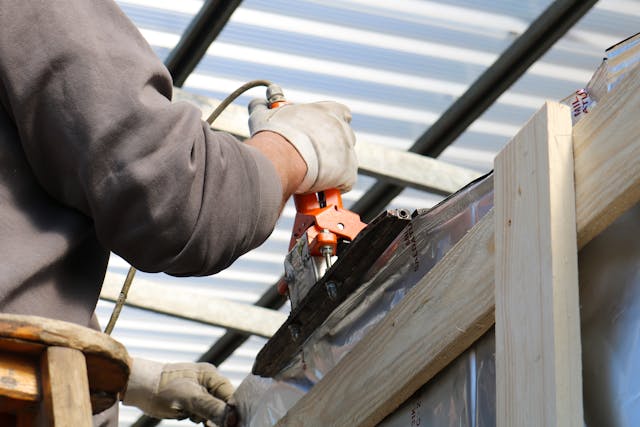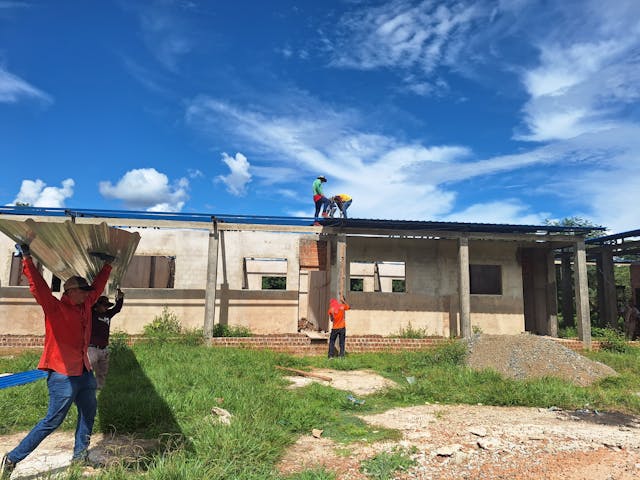When it comes to repairing or replacing your roof, one of the most important aspects of the process is ensuring that you receive fair pricing and accurate estimates. Whether you are looking for a roofing contractor to fix a leak or replace your entire roof, understanding how the best roofing contractors determine their pricing can help you make an informed decision.
Here, we will explore how the best roofing contractors provide fair pricing and estimates to help you make a wise decision.
Table of Contents
Key Takeaways
✔ A reputable roof contractor provides a fully itemized estimate detailing labor, materials, permits, and disposal fees to ensure homeowners understand all costs upfront.
✔ The best local roofing experts offer multiple pricing options, including different material choices, financing plans, and service packages to fit various budgets
✔A reliable roofing contractor maintains competitive yet ethical pricing by aligning rates with industry standards, providing honest service comparisons, and avoiding high-pressure sales tactics.
✔A trusted roof contractor ensures long-term protection by offering material warranties, workmanship guarantees, and extended coverage options for added peace of mind.

How the Best Roofing Contractors Ensure Fair Pricing
The best roofing contractors maintain fair and transparent pricing by prioritizing trust, honesty, and value for their customers. They ensure that every estimate is clear, detailed, and reflective of the actual costs involved in a roofing project
1. Transparency in Cost Breakdown
A reputable roof contractor provides a detailed, itemized estimate so homeowners know exactly what they’re paying for. This transparency prevents unexpected costs and builds trust.
- Labor Costs: The estimate should specify the number of labor hours required, the hourly rate, and the skill level of the workers involved, whether they are general laborers or specialized expert roofers for tasks like flashing installation. For instance, a roofing mechanic in the United States has an average salary of $25.49 per hour. Those should be considered as well.
- Material Costs: Homeowners should receive a breakdown of roofing materials, including the type (e.g., asphalt shingles, metal panels, or slate), the brand, and the quantity needed per square foot of roofing. This allows them to compare options and verify quality.
- Permit Fees: Roofing projects often require local permits, which vary based on municipal regulations. A professional roof contractor includes the exact permit costs in the estimate, ensuring compliance with local building codes.
- Disposal Fees: Removing old roofing materials generates waste, such as torn shingles, nails, and damaged underlayment. A transparent estimate will detail disposal methods, whether through landfill fees or recycling services.
- Additional Costs: A reliable roofing contractor should anticipate potential extra costs, such as replacing rotted decking or reinforcing structural weak spots, and provide estimated pricing for these scenarios.
2. Offering Multiple Pricing Options
The best local roofing experts recognize that homeowners have different budgets and financial needs, so they offer multiple pricing structures to ensure affordability without sacrificing quality.
- Material Choices at Different Price Points: Contractors present options ranging from cost-effective asphalt shingles to high-end materials like impact-resistant metal or architectural shingles, explaining the pros and cons of each.
- Flexible Financing Plans: Many reliable roofing contractors partner with financial institutions to offer financing solutions with low-interest or zero-interest options, allowing homeowners to spread payments over months or years.
- Customizable Service Packages: Contractors may provide tiered service packages, such as a basic package covering standard installation, a mid-tier option including extended warranties, and a premium package with extra features like annual inspections and maintenance.
3. Competitive Yet Ethical Pricing
The best roofing contractors ensure that their pricing reflects industry standards while maintaining high-quality service, avoiding deceptive tactics that could lead to hidden expenses.
- Fair Market Rates: Contractors conduct local market research to align their pricing with industry benchmarks, ensuring rates are competitive without sacrificing material quality or craftsmanship.
- Honest Comparisons: Ethical roof contractors provide side-by-side pricing breakdowns comparing their services with competitors, explaining why their pricing may differ due to superior materials, additional warranty coverage, or enhanced safety protocols.
- No High-Pressure Sales Tactics: The best professionals give homeowners time to review estimates, answer questions thoroughly, and avoid using aggressive upselling techniques that push unnecessary add-ons.
4. Warranties and Guarantees
A trustworthy roof contractor stands by their workmanship and materials by offering comprehensive warranties, ensuring long-term protection for homeowners.
- Material Warranties: Manufacturers provide warranties covering material defects, often ranging from 20 years to a lifetime, ensuring that homeowners won’t have to replace defective shingles or panels at their own expense.
- Workmanship Guarantees: A reliable roofing contractor includes a workmanship warranty (typically 5 to 10 years), covering installation errors such as improper flashing, uneven shingle placement, or inadequate ventilation.
- Extended Warranty Options: Some contractors offer extended warranties that go beyond standard manufacturer coverage, including benefits like routine inspections, preventative maintenance, and free repairs within the warranty period.
By providing various financial solutions and guarantees, expert roofers near me in Pleasant Valley, NY, help homeowners make cost-effective decisions without compromising durability and safety.
Factors That Affect Roofing Costs
The total cost of a roofing project depends on several key factors. Understanding these factors helps homeowners set realistic budgets and choose the best roofing contractor for the job. Below are the most significant elements that influence roofing costs.
1. Material Choice and Quality
The type and quality of roofing materials significantly impact the cost. Some materials are budget-friendly, while others offer long-term durability at a higher price.
- Asphalt Shingles: As one of the most affordable options, asphalt shingles offer a balance of cost, durability, and ease of installation. However, they may have a shorter lifespan compared to premium materials.
- Metal Roofing: Metal roofs have a higher initial cost but provide exceptional durability, weather resistance, and energy efficiency. This option is ideal for homeowners looking for a long-term investment with lower maintenance needs.
- Tile or Slate Roofing: Tile and slate roofs are among the most expensive materials, but they provide unmatched longevity, aesthetic appeal, and resistance to harsh weather conditions. Their weight requires reinforced structural support, adding to the installation costs. On average, tile roofing costs from $8,202 to $24,645 in the United States.
- Wood Shingles or Shakes: Wood roofing offers a natural, rustic appearance but requires regular maintenance to prevent rot and insect damage. These materials can be costlier due to their specialized installation needs.
- Synthetic Roofing Materials: Some homeowners opt for synthetic slate or composite shingles, which mimic premium materials at a lower cost while providing durability and weather resistance.
2. Roof Size and Complexity
The size and design complexity of a roof directly impact material and labor costs. Larger roofs require more materials and time to install, leading to higher overall expenses.
- Total Square Footage: Roofing costs are typically measured per square (100 square feet). A larger surface area means more shingles, underlayment, and labor are needed.
- Roof Pitch and Slope: Steeper roofs require additional safety measures, specialized equipment, and more labor-intensive installation, increasing costs.
- Architectural Complexity: Roofs with multiple valleys, dormers, skylights, or chimneys demand extra materials and skilled labor, making them more expensive to install.
- Roof Access and Removal: If the existing roof is difficult to access or requires extensive removal work, labor costs will rise. The complexity of removing old roofing materials, especially multiple layers, can add to the total expense.
3. Location and Local Building Codes
The location of your home affects roofing costs due to regional material availability, labor rates, and climate conditions. A roof contractor familiar with local regulations ensures that all requirements are met, preventing costly fines or project delays.
- Cost of Living and Labor Rates: In areas with a higher cost of living, roofing services tend to be more expensive. Labor costs can vary significantly depending on the region and the experience level of the roofing crew.
- Climate and Weather Conditions: Homes in areas prone to extreme weather, such as heavy snowfall, hurricanes, or intense heat, may require specialized roofing materials and installation techniques, increasing costs.
- Local Building Codes and Regulations: Different municipalities have specific building codes that dictate roofing requirements, such as fire-resistant materials or hurricane straps. Compliance with these codes may require additional permits or specialized materials, impacting the final cost.
- HOA or Historic District Restrictions: Some homeowners’ associations (HOAs) or historic preservation districts have regulations regarding roofing materials and styles, which can limit choices and increase costs.
4. Labor and Installation Costs
Skilled labor is one of the most significant cost factors in a roofing project. The experience and expertise of the crew influence both pricing and quality. A reliable roofing contractor prioritizes quality craftsmanship, ensuring that the investment in labor results in a durable, long-lasting roof.
- Experience and Skill Level: Hiring expert roofers near me in Pleasant Valley, NY, with a proven track record ensures precision, safety, and durability. While their rates may be higher, investing in skilled professionals reduces the risk of installation errors and future repairs.
- Number of Workers Required: Larger or more complex roofing jobs require additional laborers, increasing total labor costs.
- Timeframe and Project Duration: A faster turnaround may require a larger crew or overtime labor, adding to expenses. Some homeowners opt for premium service to expedite the installation process.
Red Flags to Watch for in Roofing Estimates
Not all roofing contractors operate with integrity, and some may provide misleading estimates to win business. Being aware of potential red flags helps homeowners avoid scams and ensures they hire a reliable roofing contractor for their project. Below are some common warning signs to watch out for when reviewing roofing estimates.
1. Extremely Low Bids
A significantly lower estimate may seem appealing, but it can be a sign of cost-cutting practices that compromise quality. A roof contractor with integrity provides a competitive but realistic estimate that reflects high-quality materials and workmanship.
- Use of Low-Quality Materials: Some contractors use cheap, substandard materials to keep costs down, leading to a roof that deteriorates quickly and requires frequent repairs.
- Inexperienced or Unlicensed Labor: A low bid might mean the contractor is using unskilled labor or operating without proper licensing, increasing the risk of installation errors.
- Hidden Charges in the Final Bill: Some unethical contractors initially offer a low estimate only to introduce unexpected costs midway through the project. These additional fees can quickly make the “affordable” estimate much more expensive.
- Lack of Warranties or Guarantees: A cheap estimate might exclude important warranties, leaving homeowners with no protection if issues arise after installation.
2. Lack of a Detailed Written Estimate
A trustworthy roof contractor will always provide a written estimate that clearly outlines all costs and project details. Working with local roofing experts who provide transparent, itemized estimates ensures that homeowners fully understand the costs and scope of their roofing project.
- No Breakdown of Costs: A vague or generic estimate that lacks itemized pricing for materials, labor, and additional services is a major red flag. Without this breakdown, homeowners can be charged arbitrary amounts later.
- Verbal Quotes Only: Contractors who refuse to put their estimates in writing may not honor the agreed-upon price, leading to unexpected cost increases. Always request a written, signed estimate before committing.
- Exclusion of Permits or Disposal Fees: Some contractors omit permit costs, old roof disposal fees, or taxes from the estimate, making their bid seem cheaper upfront but more expensive later.
- No Start and Completion Dates: A reliable estimate should include a projected timeline for the project. Without this, there is no accountability for delays or unfinished work.
3. Hidden Costs and Surprise Fees
Some contractors advertise a low base price but add multiple unexpected charges throughout the project. The best roofing contractor provides a transparent estimate that accounts for all foreseeable expenses, preventing unpleasant surprises.
- Unexplained Additional Labor Costs: If the estimate does not specify labor costs, the contractor may later claim the job took longer than expected and demand extra payment.
- Sudden Material Upgrades: Some contractors will claim that the originally quoted materials are unavailable and push for an “upgrade” at a much higher cost.
- Structural Repairs Not Included: If the contractor does not inspect the roof beforehand, they may later claim that structural reinforcements are needed and charge exorbitant fees.
- Unjustified Emergency Fees: Some unethical contractors create a false sense of urgency, insisting that work must start immediately to prevent damage—only to charge extra for “emergency” service.
4. Pressure Tactics or Immediate Contracts
Reputable expert roofers understand that homeowners need time to evaluate their options. The best roofing contractor will never rush a decision or pressure a homeowner into signing a contract without reviewing all terms thoroughly.
- “Limited-Time Offers” to Force a Decision: Some contractors create fake urgency, claiming a discount is only available if the homeowner signs the contract on the spot.
- Refusal to Provide References or Reviews: Ethical contractors encourage potential clients to verify their work through past customer reviews and references. A contractor who discourages this may be hiding a poor track record.
- Demanding Large Deposits Upfront: While small deposits are standard, contractors who request an unreasonably large portion of the payment before any work begins could be running a scam.
- Discouraging Homeowner Involvement: If a contractor refuses to answer questions, discourages you from overseeing the project, or avoids discussing specific details, they may be attempting to cut corners.
Frequently Asked Questions (FAQs)
How long does it take to receive a roofing estimate?
The timeline for receiving a roofing estimate depends on the contractor and the complexity of the project. Most reputable roofing contractors provide an initial estimate within 24 to 48 hours after inspecting the roof. If the job requires special materials or extensive repairs, it may take a few extra days to receive a detailed, itemized estimate. A reliable roofing contractor will communicate any delays and provide a realistic timeframe for the estimate.
Can I negotiate a roofing estimate with my contractor?
Yes, homeowners can discuss the estimate with their roof contractor and explore options to adjust costs. Some contractors may offer alternative materials, financing plans, or phased project options to fit different budgets. However, avoid pushing for unrealistically low prices, as this may result in compromised quality. The goal should be to ensure fair pricing while maintaining high standards of workmanship and materials.
Does homeowner’s insurance cover roof replacement?
Homeowner’s insurance may cover roof replacement, but it depends on the cause of damage and the policy terms. Insurance typically covers damage caused by storms, hail, fire, or other sudden events but does not cover general wear and tear or neglect. Before hiring expert roofers near you in Pleasant Valley, NY, homeowners should contact their insurance provider to determine their coverage and understand any deductibles or claim requirements.
How do I know if a roofing estimate is fair?
A fair roofing estimate is transparent, itemized, and competitive with other quotes from local roofing experts. It should outline material costs, labor charges, and any additional fees without hidden costs. To ensure fairness, homeowners should compare estimates from multiple contractors and check for industry-standard pricing in their region. A fair quote also includes warranty details and a clear project timeline.
What should I do if I receive multiple drastically different estimates?
If you receive roofing estimates that vary significantly, take time to review each one carefully. Look at the details, such as material quality, labor costs, warranties, and project scope. A low estimate may indicate hidden costs or inferior materials, while an overly high estimate could suggest unnecessary upgrades. Consulting with a best roofing contractor for a professional second opinion can help clarify discrepancies and ensure you’re making an informed decision.
Enhance Your Roof’s Performance and Save on Energy Costs Today!
If you’re ready to improve your roof’s performance and cut energy costs, trust Roofer of Wappingers Falls LLC—the top roofing contractor in Wappingers Falls, NY. With nearly 20 years of experience, our licensed specialists deliver expert commercial and residential roofing solutions, always on time and within budget.
Contact Roofer of Wappingers Falls LLC today to schedule your roof coating service and start saving!

